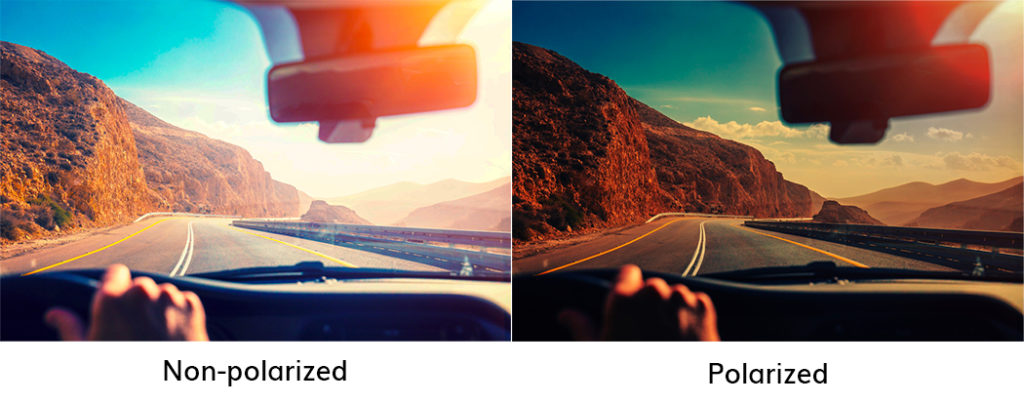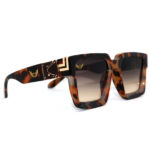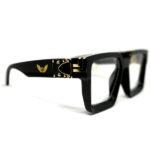Polarized Sunglasses – What’s The Big Deal?
Polarized sunglasses are a big deal, however many people do not know why.
When you see sunglasses marketed as polarized sunglasses you may not understand what this indicates. You probably think that normal sunglasses are simply as good, so why bother paying the extra expense to have polarized lenses in sunglasses. You always hear about wearing lots of sunscreen to secure your skin, but there is really little stated about using polarized lenses in sunglasses to protect your eyes. When you are out in the sun, the reality is that polarized sunglasses are better for your eyes and do help you to have clearer vision.
You can truly benefit from polarized sunglasses if you spend any amount of time outdoors in direct sunshine. Those who are associated with sports, such as golf, surfing, biking and even snow sports, depend on the protection that polarized sun glasses supplies them from UV rays. You always hear about wearing lots of sunscreen to protect your skin, but there is very little stated about using polarized lenses in sunglasses to safeguard your eyes.

When the sun reflect off flat surface areas, polarized sunglasses make use of unique technology that assists to reduce the effects of the glare you get. The polarized lenses in the sunglasses neutralize the horizontal rays with vertical polarizers making it possible for you to see clearly. While this may include scientific terms, the bottom line is that when you wear polarized sunglasses, you no longer need to squint when you look into direct sunlight.
Although most of the designers of sunglasses advertise their products tailored towards particular groups of people, such as those trying to find fishing or baseball sunglasses, anyone can use polarized sunglasses and enjoy their benefits. Therefore, getting the ultimate protection from UV rays and still maintaining true color when you take a look at items is the objective behind the designer sunglasses containing polarized lenses.
Check out the styles of all the major lines of sunglasses. You will find that almost all of them have polarized sunglasses. The polarized sunglasses on the marketplace come in all various colors of lenses and in extremely trendy designs. Oakley, Hobie, Arnette, Shari Dionne — all of these famous companies produce sun glasses with polarized lenses.
When you prepare a day at the beach, in addition to your sunscreen and towels, do not forget to pack your polarized sunglasses. You do need to safeguard your vision, and using polarized sunglasses is the best way to go.
For more information on the benefits of polarized sunglass.
Choosing the right glasses might be difficult. Take some time to consider a few items if you want to be completely happy with your investment. For example, you may discover that purchasing polarized sunglasses rather than normal sunglasses is more cost-effective. If you’re not sure what polarization is or why you could benefit from your purchase, now’s the time to find out. Use this guide to become acquainted with some fundamental concepts about the polarization choice for sunglasses.

Glare isn’t only inconvenient, it can be hazardous, especially while driving. If you spend a lot of time outside, polarized lenses would be an excellent choice for your next pair of shades. Polarized sunglasses are intended to minimize glare from reflective surfaces such as liquid, snow, and glass. Glare alters the real color of objects, making them more difficult to view. Polarized sunglasses are well-known for their ability to reduce glare that reflects off specific surfaces. As a result, they are highly popular among persons who spend a lot of time outside, on the road, or near bodies of water. Let’s take a closer look at polarized sunglasses and see how it works for you.
What are Polarized Sunglasses?
What does polarized sunglasses mean? When light is emitted straight from a source, its light waves move vertically, horizontally, and at all angles in between. This “raw” light is filtered by a polarized lens, which enables only vertical waves to pass through. This is how polarized sunglasses achieve their finest feature: glare reduction or removal. Glare occurs when horizontal light reflects directly into your eyes. Polarized sunglasses eliminate glare, and so address this issue.
How Do Polarized Sunglasses Work?
What is polarized sunglasses? To filter light, polarized lenses are treated with a specific chemical. The molecules of the chemical are precisely aligned to prevent some of the light from going through the lens. Consider it a miniblind that hangs in front of a window. Only light passing through the blind’s perforations is seen.
The filter in polarized sunglasses generates vertical holes for light. Only light rays approaching your eyeballs vertically can pass through such gaps. The lenses, for example, prevent all horizontal light waves from bouncing off a smooth pond or a gleaming automobile hood. Because of this filtering, the picture seen via polarized lenses is somewhat darker than normal. Polarized lenses, on the other hand, make objects appear sharper and clearer. To improve vision, polarized lenses can be paired with additional characteristics such as bifocal sunglasses, progressive lenses, and anti-reflective and anti-scratch coatings.
How do you know whether your sunglasses are polarized or not? To compare, get a pair of inexpensive drugstore sunglasses. Make a 90-degree angle between the lenses of your sunglasses and the lenses of the drugstore sunglasses. Your know your sunglasses are polarized if the combined lenses become dark or virtually black. These glasses operate by avoiding direct light glare from entering your eye. A specific chemical is used to cover the lenses, preventing part of the light from going through.
Benefits of Polarized Sunglasses
Great For Driving
When sunlight strikes curved windshield glass, it spreads out and creates a strong, distracting glare. Polarized sunglasses can help to filter out a lot of it, especially on a sunny or partly overcast day. Reducing windshield glare gives you a perspective of the road that is similar to what you would have if you didn’t have a windshield at all. Driving is safer when you can concentrate on the road rather than adjusting your perspective or shielding your eyes from dazzling streaks of light.
Great For Water Activities
The ability to see what’s swimming beneath the surface reflections of the water is a huge benefit for many while fishing, both for site reconnaissance and seeing what you’re hauling in before it breaks the surface. Polarization, for the same reason, may transform canoeing, kayaking, and sailing into a totally new experience. Consider it above-water snorkeling. Therefore, if you are fishing you should consider polarized fishing sunglasses. Here is a list of polarized sunglasses for fishing.
Better Pictures
A polarizing filter is a typical photography accessory for covering a camera’s lens. It can cut through reflections and boost the richness of natural colors, similarly with polarized glasses. When you wear polarized sunglasses, you may take a step back from the viewfinder and get a better idea of how your photo will look in real-time if you use one of these filters.
Vibrant Outdoor Colors
When it comes to natural beauty, few things beat staring up at a big, open sky that nearly appears bluer than blue. Tiny particles in damp or dirty air, on the other hand, might decrease the blue color, giving it a white, yellow, or gray overcast. When the reflections from such particles are blocked by a polarizing lens, the sky may frequently preserve its deep blue color. It may be a tremendous visual pleasure when contrasted against green foliage or white beach.
Disadvantages Polarized Sunglasses
While polarization is often beneficial, there are situations when “too much of a good thing” may be detrimental. It’s understandable to assume that lowering glare will make night driving safer. While this is sometimes true, it is not always the case. Using polarized glasses at night, according to the American Academy of Ophthalmology, may be detrimental since they block too much light in a situation where it is already so little. They propose cleaning your car windows and headlights, replacing broken wiper blades, and maintaining any eyewear prescriptions up to date instead of using special driving glasses.
Polarized Sunglasses can help to lessen sun glare from ultra-reflective snow and ice, but it can also be damaging. Skiers may struggle to avoid areas of ice or hardened snow if they can’t notice them in the first place. Less bright light is normally a good thing, but in this situation, it might be dangerous. Skiing is usually done with standard, non-polarized sunglasses or snow goggles. Polarized sunglasses can reduce the brightness of digital screens such as those seen on your smartphone, GPS, and calculator. Fortunately, this dimming effect normally occurs only while viewing a screen from an odd angle. For example, while holding your phone upright, the screen may be entirely visible yet too dark to read.
Polarized Sunglasses are Best For
Yes, in most circumstances, polarized sunglasses are preferable. They can decrease reflections, reduce glare, and make a beautiful day appear as it belongs on a postcard. However, as you can see, there are a few situations in which they do not perform as well. It all depends on how you want to use them, and it’s usual for individuals to have polarized sunglasses for some situations and non-polarized, “normal” sunglasses for others.
If you’ve never worn these sunglasses before, try giving them a spin at your local optical store – preferably on a sunny day. Take a look around the shop and out the window. Where do you see the most variations in clarity and vibrancy? What about the sky, automobile windshields, and roads? Polarized lenses are not suitable for everyone. However, if they are suited for you, they may alter your perspective of the world.
Disadvantages of Polarized Sunglasses
Polarized sunglasses come in a variety of shades. If you are a first-time buyer, you should be aware that the darker the lens, the more polarization there is. Polarized lenses are available in gray, brown, blue, green, and yellow. As always, no sort of sunglass lens will allow you to gaze directly into the sun without causing injury to your eyes. When it comes to your eyes, be cautious and make sound judgments. Make an appointment for frequent eye exams to stay on top of any issues before they can be controlled or corrected. Polarized lenses are still stylish and may complement your own style.
It is crucial to note that polarized prescription sunglasses do not offer the same level of UV protection as other alternatives. While UV protection is still provided, polarization is more focused on reflected light than direct light. If you need the most UV protection available, non-polarized UV400 sunglasses are the way to go. Anyone who works with more horizontal light on a regular basis, on the other hand, will find that polarized glasses make glare less bothersome.
Do I Need Polarized Sunglasses
Polarized sunglasses have a chemical screen that reduces glare. They function by preventing light waves from bouncing off horizontal surfaces. When driving or engaging in water sports, polarized lenses come in handy. Are polarized sunglasses better? They aren’t, however, appropriate in every case. These glasses make it difficult to see properly whether driving at night, traversing snowy spots, or using LCD displays.


